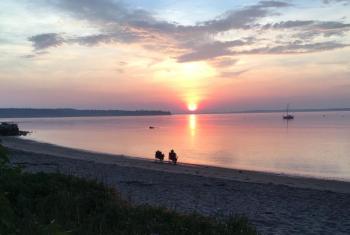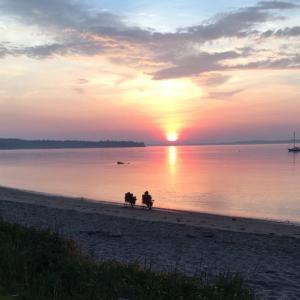This Week in Lincolnville: We’re All Immigrants
I like to take a mental trip around town from time to time, riding up and down our roads in my mind, wondering about my neighbors.
How are they doing with another new baby?
And how is he coping with the loss of his wife?
Their youngest goes to college this fall: empty nest for them.
Wonder why no one’s ever home in that house.
Driveway’s full of pickups; they must be remodeling.
Driveway’s full of pickups; that man must have died.
CALENDAR
WEDNESDAY, July 31
Watercolor Journaling, 4-6 p.m., Library
THURSDAY,Aug. 1
Soup Café, Noon-1 p.m., Community Building, 18 Searsmont
FRIDAY, Aug. 2
Family Music, 11 a.m., Library
SATURDAY, Aug. 3
Intro to Pickleball and Open Play, 8-10 a.m., LCS Outdoor Courts, 523 Hope Road
EVERY WEEK
AA meetings, Tuesdays & Fridays at 12:15 p.m., Wednesdays & Sundays at 6 p.m., United Christian Church
Lincolnville Community Library, open Tuesdays 4-7, Wednesdays, 2-7, Fridays and Saturdays, 9 a.m.-noon. For information call 706-3896.
Soup Café, every Thursday, noon—1p.m., Community Building, Sponsored by United Christian Church. Free, though donations to the Community Building are appreciated
Schoolhouse Museum open M-W-F, 1-4 p.m.
Bayshore Baptist Church, Sunday School for all ages, 9:30 a.m., Worship Service at 11 a.m., Atlantic Highway
United Christian Church, Worship Service 9:30 a.m., Children’s Church during service, 18 Searsmont Road
COMING UP
Blueberry Wing Ding: Aug. 10
Sounds nosey doesn’t it? We’d call it concern if we were all related, if the empty-nesters were my brother and his wife or the new parents were my daughter and son-in-law. Instead, what all of us have in common is simply that we live in this rural place of 2,164 people. We’re a community, both in the political sense as a town as well as socially, as human beings with the same sensibilities, the same worries, the same needs.
I scan the obituaries every morning in the Bangor Daily News, looking for “Lincolnville”, but my eye also stops on “Camden” or “Hope”, “Appleton” and “Searsmont”. Since I once taught school in Rockland many of those names are familiar. Our midcoast community does reach beyond our borders.
Communities divide in many ways:
by age – with a growing family living upstairs I’m constantly reminded of that hectic stage in life, a time that for a 75-year-old is generally lost in the mists of memory;
by sex – there aren’t many men in the Library’s needlework group;
by occupation – lobstermen share a bond for instance, and so do therapists;
by interests – hunters talk deer, historians talk old stuff, car guys talk cars, women share recipes;
and certainly in our town, by immigration status. Or would emigration describe it better?
Some of us were born here and some of us came here. I hadn’ t been here (in Rockland to be specific) more than two weeks when I heard this story from an old fellow. His wife’s parents had brought her at the age of six months to Rockland where she grew up. In the midst of a discussion of some local issue she was once asked, “You’re not from here, Bessie; what do you think?”
I emigrated to Maine in 1967 and knew, right from the start, that I wouldn’t be leaving for greener pastures. I found a house to rent in St. George and that first winter felt very much on my own. “Who is she?” my neighbors wondered. “Where is she from? Everyone knows there’s only one bed in that house, and she’s got those hippies living with her.” That would be a couple of visiting college friends, her wire rim glasses and his pony tail the hippie giveaway.
The first winter passed, spring came and I was still there. That summer my next door neighbor started speaking to me. I think she’d been waiting to see if I’d stay, not wanting to invest time in me if I wasn’t. I lived there three years, getting well-prepared for Lincolnville.
When we bought the house at the top of Sleepy Hollow in 1970 we were certainly talked about, especially when word got around that Wally would be the new principal and 7-8 grade teacher at Lincolnville Central School. Over the years we heard via the grapevine (“I think you ought to know…” that deadly phrase that precedes information you definitely don’twant to know) that we were rich, that my father bought this house for us, that we were drug dealers, and more that I’m sure we definitely didn’t want to know.
Out-of-staters were buying houses and land in Lincolnville in ever-increasing numbers through the 70s and 80s, and actually living in them. These weren’t summer homes. These were families with babies and toddlers, and then more babies who started filling up the grades at LCS. Native-born or from away didn’t much matter on the Little League field or at the Pinewood Derby. Grange suppers, hunters’ breakfasts, the yearly Christmas party and bonfire found us standing side by side, cheering on a little soccer player or serving baked beans and slices of pie, getting to know each other.
By the 90s and 2000s retirees were finding their way here, “young” retirees with a lot of energy, looking for useful things to do in their new community. Thanks to them we have a library, a municipal solar array, a sewer district in the works at the Beach, well-tended gardens in public places, two vibrant churches serving two different denominations. At the same time the fire department was developing and funding a modern facility that any town could be proud of. And thanks to the combined efforts of many parents in the early 2000s we have a wonderful school building, a school with such an excellent reputation that people choose to move to Lincolnville because of it.
Yet in spite of some four decades of in-migration if often feels as if we’re two distinct populations living within the same 39 square miles. What exactly have been the things that divide us? How are we so different?
By definition the emigrants have a wider experience of the rest of the country. They bring new ways, are often quick to compare the way things were done where they came from. That in itself can put the natives off.
On the other hand the natives know how to navigate their world, a place of harsh winters, insane bugs, isolation, no malls. They know the history of the place, know what works here and what doesn’t. The deep, dark woods are scarey. That in itself can put the newcomers off.
At the bottom it’s fear. One group is afraid their town will be changed beyond recognition. The other group is afraid they might fail in this alien environment.
The Library’s annual Picnic Supper and Auction the other night got me wondering why, in spite of our successes at melding our two populations, there was exactly one Lincolnville born and raised person at this event. That would be the auctioneer, Rosey Gerry who manages to easily navigate both sides of the fence.
Now that we have two stores in the Center we get our pizza and coffee and pick up a six-pack in different places. The long table at Drake’s is reminiscent of the old Dean and Eugley’s, the garage that stood where the Library is today. Walking into D & E’s was intimidating to the newcomer, especially to a woman. All conversation would stop when I came in, and presumably resume as soon as I left. They must be talking about me, I’d worry.
But then came the day, probably in the late 70s, when I took a petition in there, looking for signatures to halt a proposed new consolidated school to be built in Hope, a school that would send our children on a bus out of town every day. The guys eagerly signed it and seemed to be looking at me with new eyes. This newcomer, wife of the principal no less, can’t be all bad. She wants what we want.
And that’s another way we’ve found common ground between the natives and the émigrés – working together on town issues. Friendships have formed between people serving on town committees: Select Board, School and Budget Committee, Planning Board and more. Respect for each other’s opinions on the array of issues they must deal with has done a lot to bring us together.
Here’s another way we’re one people, one town. When someone’s in trouble – illness, grieving, out of work, house burned down – we generally know it. Remember my mental tour? I suspect everyone does this to some extent, if only in their own immediate neighborhood.
When young Wayne Harwood died tragically a couple of weeks ago a Go Fund Me account (the modern version of the collection jar at the cash register) brought in money to help the family handle funeral expenses.
When our grandson was battling brain cancer as a three-year-old, Donnie and Carrie Heald spearheaded a benefit supper that both warmed our hearts and helped tremendously with the expenses the parents couldn’t handle.
When Kory Whitfield’s house burned down, the Lincolnville Bulletin board lit up with people wondering what they needed; again, through Go Fund Me help came in.
If you remember the benefit for Jackie and Maurice Watts, put on, I believe by the Fire Department, you’ve been in town for quite a while. That was the night we all bid on head shaving, and David Kinney succumbed.
We have our differences. We – too often – retreat to our own corners, but when one of us needs help Lincolnville pulls together.
Library
Julie Turkevich writes: “We have a bonus Wednesday for watercoloring this week, and the Library welcomes us to come and splash a few summertime colors in our journals, 4-6 p.m.. I have extra paints, brushes and paper for anyone to use.”
This Friday, August 2 Jessica Day and her Family Music hour, 11 a.m., will be at the Library. Parents, grandparents, or other caretakers are invited to bring children from infant to five years of age, and their siblings, to sing, dance and play simple instruments in this lively, free social event. The library is delighted to be able to offer this special program every first Friday of the month.
Once again the annual Picnic and Auction was a lot of fun: Rose Lowell’s pulled pork along with homemade beans, salads, watermelon and Kathleen Oliver’s huge cookies. Rosey auctioned off a couple of dozen items in an hour and, big suspense of the evening, the drawing for Windsor Chair’s gorgeous chair. It went to Greta Gulezian who said she never wins anything!
Pickleball
Every Saturday morning till October Introduction to Pickleball and Open Play will be held at the outdoor courts at the school, 8 -10 a.m. Paddles are provided, and with two courts available eight players at a time can play. Greta Gulezian, our resident Pickleball enthusiast and promoter, says her plan is to get, through donation or fund-raising, a courtside storage chest for the portable nets which must be set up on the courts. The PB court is considerably smaller than a tennis court and uses special nets.
Once the equipment can be stored on site people can play anytime, setting up and taking down the nets when they’re done. A new google groupespecially for Pickleball players will enable foursomes to form online and go out to play at their convenience.
Condolences
Martha McIntosh, a Camden native, who moved to Lincolnville about the same time we did, passed away last week. We raised our kids together; my oldest and her only were classmates all through school. I’ll miss the “catch-up” chats we had whenever we ran into each other.
And Kip Stinson, another long-time Lincolnvillian died this past week. His family had gathered to celebrate his 90th birthday in May. I’m sure everyone’s happy they did.
Plant Identification
Do you ever wonder what that weed is, or tree, or critter? I’ve started using an app on my phone: inaturalist https://www.inaturalist.org/You snap a photo of the thing – I’ve done plants, insects, shells – and you get the probable identification of its species/genus/etc. The app is free.
Schoolhouse Museum
Stop by the Historical Society’s museum, upstairs at 33 Beach Road, also known as the LIA building. We’re open M-W-F, 1-4 p.m. through Columbus Day.
Event Date
Address
United States


























